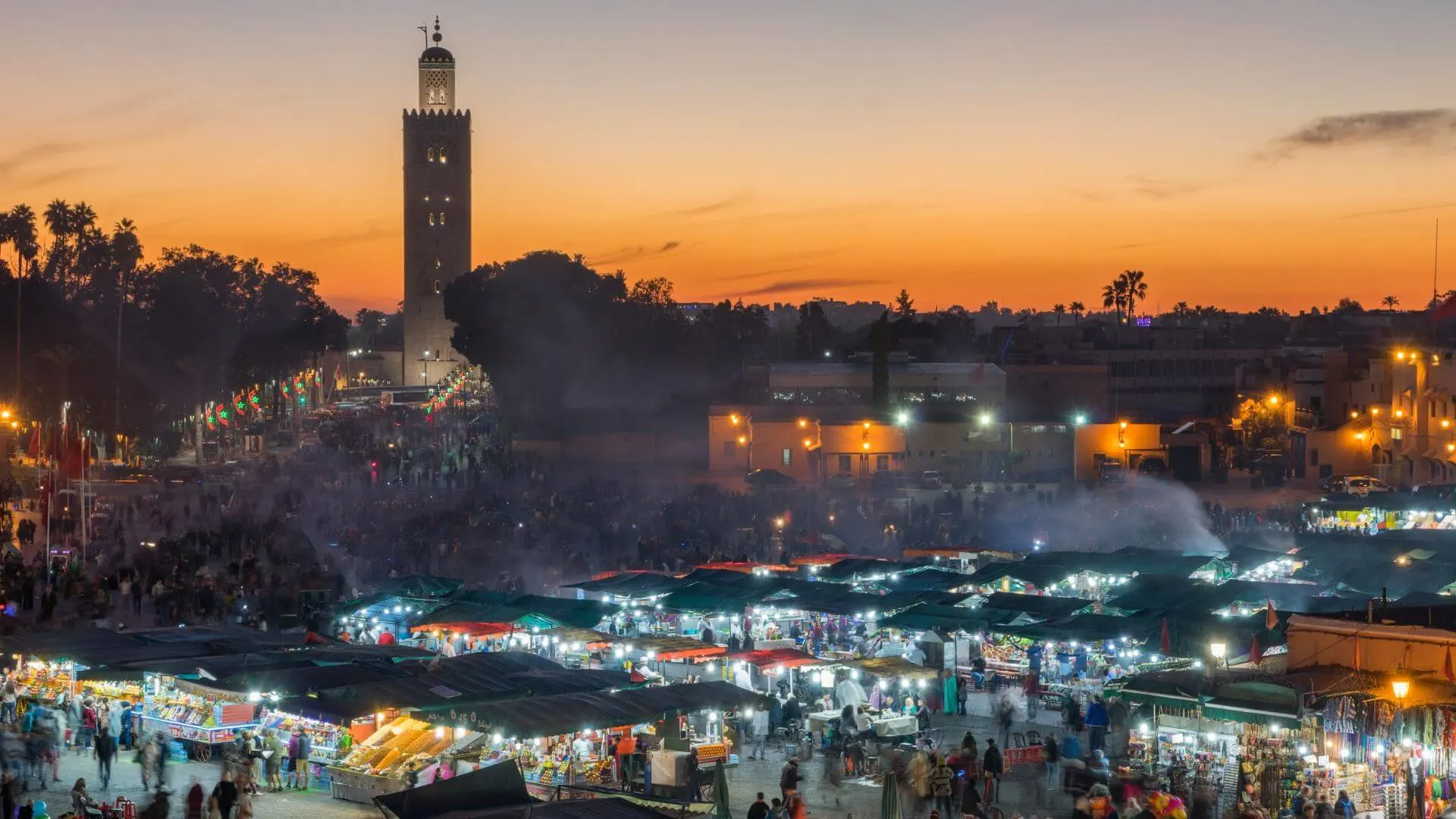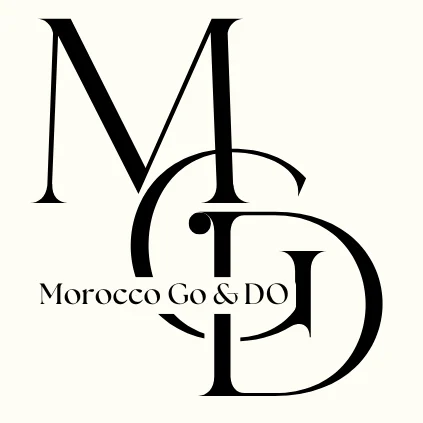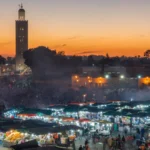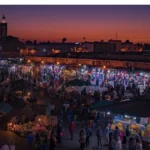Morocco
Where to Go & What to Do

The Moroccan government works hard to keep tourists safe. This is because tourism is very important for the country’s economy. But, travelers should still watch out for small thefts, cultural mistakes, and health issues. Knowing about these risks can help make your trip safer and more fun.

This section covers key safety aspects in Morocco, like cultural norms, crime rates, and tips for women travelers. Knowing Morocco cultural etiquette helps travelers avoid cultural misunderstandings and enjoy their stay.
Respecting local customs and traditions is crucial in Morocco. Dress codes and social behavior are important. Women should dress modestly, showing respect for Morocco cultural etiquette.
Public displays of affection are frowned upon. It’s best to greet people with “Salam Alaykum,” which means ‘peace be upon you.’
Violent crime in Morocco is rare, but travelers should stay alert, especially in tourist areas. Petty theft, like pickpocketing, is common in crowded places. Keeping valuables safe and being mindful of your surroundings helps prevent theft.
Recent data shows most crimes in Morocco are petty theft. So, it’s wise to be cautious.
For Morocco safety for solo female travelers, there are special considerations. Women might face harassment. Wearing modest clothing and traveling with others can help reduce these risks.
Understanding Morocco cultural etiquette helps women navigate social situations safely. This makes their trip both safe and enjoyable.
To answer if is Morocco safe for Americans, we need to look at many factors. The Morocco U.S. travel advisory from the U.S. Department of State is key. It tells us about safety tips and possible dangers for American tourists.
Morocco is seen as a friendly place for American visitors. The people there are very welcoming to guests from other countries. But, we must also think about the political situation, the stability of the area, and Morocco’s relationship with the U.S. These things can affect how safe Americans feel.
In the past, American tourists’ safety in Morocco hasn’t been a big problem. But, it’s still important for Americans to be careful and know what to do in emergencies. It’s best to keep a low profile and not do anything that might attract unwanted attention.
The safety advice often changes based on the political and stability situation. So, it’s important for travelers to keep up with the latest news and advisories about Morocco. This will help them decide if is Morocco safe for Americans.
Travelers often wonder about the safety in Moroccan cities. This section looks at the safety in major cities like Casablanca and Marrakech. We also cover other notable cities.
Many ask is Casablanca Morocco safe. As the largest city, Casablanca has a strong police force. There are even tourist police to help visitors. But, it’s still wise to watch out for petty theft in crowded places.
Keeping valuables safe and avoiding dark places at night can help. These simple steps can make your visit safer.
The safety in Morocco Marrakech is also a big concern. Marrakech is famous for its lively markets and old sites. It attracts many tourists every year.
The city has taken steps to keep visitors safe. There are more police in tourist areas and cameras to watch over them. But, it’s still important to be careful in busy places like Jemaa el-Fnaa. Pickpocketing can happen there.

By staying alert and following local advice, you can have a safe trip to Marrakech.
Other Moroccan cities like Fez, Tangier, and Rabat also have their own safety levels. Fez’s narrow medina means you need to keep an eye on your belongings. Tangier, being a port, has strict security at its transport points.
Rabat, the capital, has more government security. This makes it a safer place. But, it’s always good to follow basic safety tips everywhere you go.
| City | Key Security Features | Traveler Tips |
|---|---|---|
| Casablanca | Tourist police, regular patrolling | Avoid isolated areas, secure valuables |
| Marrakech | Surveillance systems, enhanced patrolling | Be wary of pickpockets, stay in well-lit areas |
| Fez | High security in medina | Stay vigilant with personal items |
| Tangier | Security at transport hubs | Exercise caution at ports |
| Rabat | Government security presence | Follow local advisories |
Traveling to Morocco is a chance to see new cultures and beautiful places. To make your trip safe and fun, know about local places to stay, how to get around, and health tips.
Choosing Morocco accommodations safety means many options. You can pick from fancy hotels to cozy riad guesthouses. Hotels have better security, like 24-hour watch and safe doors. Riads offer a close feel with personal service. Make sure your place is safe and in a good area.
Knowing about transportation in Morocco helps keep you safe. Moroccan cities have taxis, buses, and trains. For safety, take registered taxis, especially petit taxis for short trips and train services for longer ones. If you rent a car, be careful because roads and driving can be different.
| Mode of Transport | Safety Tips |
|---|---|
| Taxis | Make sure it’s registered; agree on the fare first. |
| Buses | Choose known and safe bus companies; keep things safe. |
| Trains | First-class tickets offer more comfort and safety. |
To stay healthy in Morocco, take some steps. Make sure you have the right shots, like for hepatitis A, typhoid, and rabies. Drink bottled water and be careful with street food. Also, get travel insurance that covers health and emergencies.
Planning a trip to Morocco? It’s key to know the Morocco visa requirements and legal travel considerations. Morocco has clear rules for visitors, especially about visas and entry. Knowing these rules helps ensure a legal and smooth trip.
U.S. citizens wondering if they need a visa for Morocco can relax. Americans can visit Morocco for up to 90 days without a visa for tourism or business. Just remember to bring a valid passport with at least six months left before it expires.
For stays longer than 90 days, Americans need to get a visa from the Moroccan consulate or embassy. If you plan to work, study, or research, you’ll need the right visa and permits. Make sure to follow the Morocco visa requirements closely.
Remember all legal travel considerations too. This includes having return tickets and enough money for your stay. Also, follow local laws, like registering with authorities for longer stays. This keeps you in line with Morocco’s laws.
| Visa Type | Duration | Requirements |
|---|---|---|
| Tourist Visa | Up to 90 days | Valid Passport, Return Ticket, Sufficient Funds |
| Business Visa | Up to 90 days | Valid Passport, Business Invitation |
| Long-term Visa | Beyond 90 days | Visa Application, Appropriate Documentation |
| Student Visa | Study Period | Valid Passport, Acceptance Letter |
Understanding safety in Morocco means knowing the culture, crime rates, and travel rules. Morocco is mostly safe for visitors, including women and Americans. But, it’s important to stay alert and use common sense.
Cities like Casablanca and Marrakech have their own safety levels. While they are generally safe, some areas or times need extra care.
Crime rates show that small thefts are common. But, these can often be avoided by being careful and aware of your surroundings. Women should respect local customs and stay alert to feel safe.
Legal issues, like visa rules for Americans, are clear. This makes entering Morocco easier.
Staying safe in Morocco means always being ready and informed. Choose good places to stay, use safe transport, and follow health advice. This helps you face any problems.
Travel advice suggests doing your homework and keeping up with safety alerts. This way, you can have a safe and fun trip in Morocco.
Morocco’s safety for travelers depends on several factors. These include the country’s stability, crime rates, laws, and cultural norms. Travel advisories and data from security agencies are good starting points.
With its rich history and diverse culture, Morocco is a popular but cautious destination. The local government works hard to keep tourists safe.
It’s important to understand and respect Moroccan culture. This means following dress codes, especially in conservative areas. Also, knowing local social etiquette helps avoid problems and ensures a better trip.
Petty theft is common, especially in crowded places and tourist spots. To stay safe, be vigilant, keep your belongings secure, and be aware of your surroundings.
Many women travel safely in Morocco. However, harassment can happen. Solo female travelers should dress modestly, avoid isolated spots, and be cautious with strangers.
Knowing the local culture can greatly improve safety for women.
Morocco welcomes American tourists. But, it’s wise to check the U.S. Department of State’s travel advisory. Staying discreet and following local customs and laws helps ensure safety.
Casablanca has areas with higher safety concerns. The presence of law enforcement and tourist police helps. Still, travelers should be careful, especially in crowded and tourist-heavy zones.
Marrakech is generally safe for tourists. But, watch out for pickpockets and scammers, especially in the Medina. Following safety tips and staying alert ensures a secure visit.
Cities like Fez, Tangier, and Rabat have their own safety tips. While safe, it’s good to research specific advice for each city. Following standard travel safety measures is also important.
Morocco offers various accommodations, from riads to hotels. Safe options include those recommended by travel agencies or well-reviewed online. Make sure your accommodation has good security.
Morocco has safe transportation like taxis, buses, and trains. Licensed taxis and day travel are safer. Avoiding crowded buses and rural areas also helps.
Be aware of health risks and take precautions like vaccinations. Ensure food and water safety and have travel insurance. Carry basic medical supplies and know nearby hospital locations.
Americans and Uk citezens don’t need a visa for up to 90 days but they need a passport valid for six months. For longer stays, a visa is needed. Knowing the visa process and required documents is crucial.




